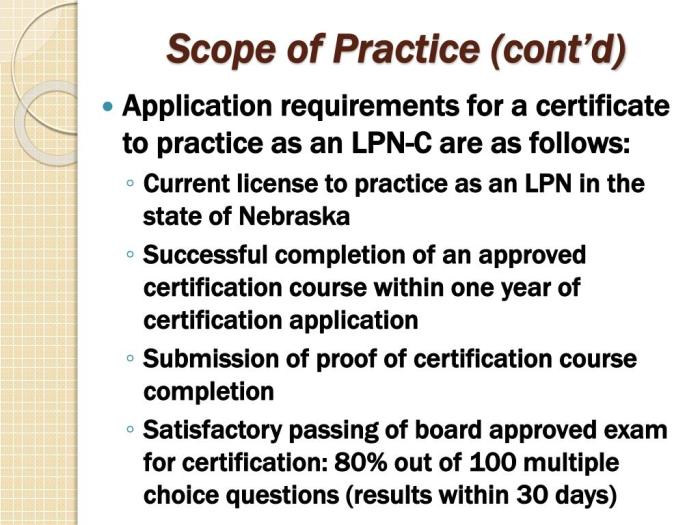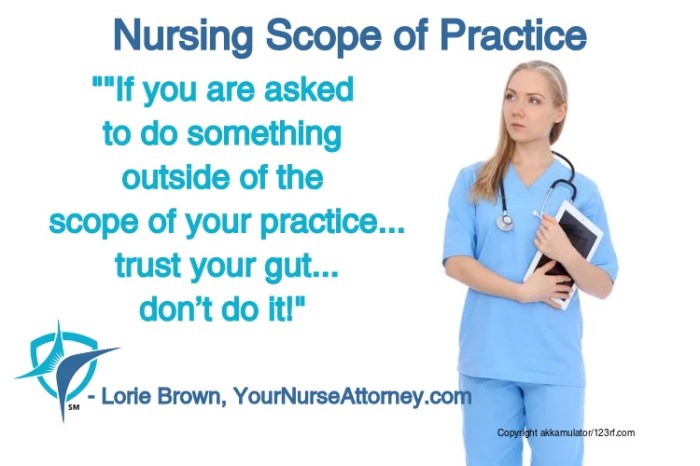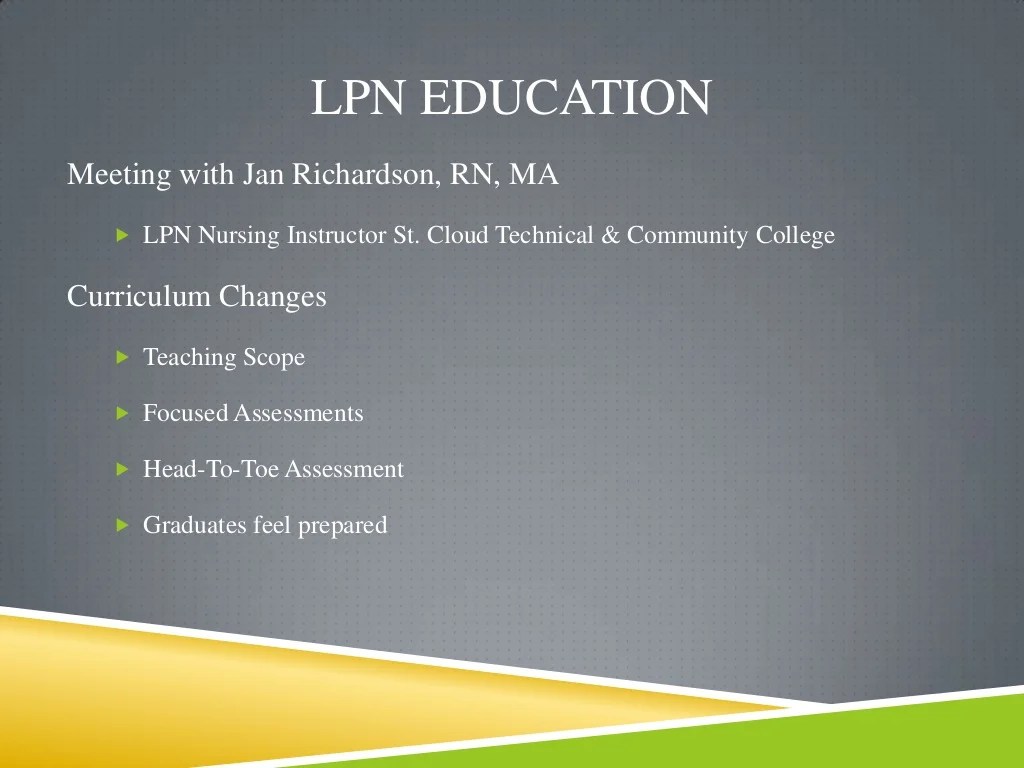Lpn scope of practice massachusetts – The LPN scope of practice in Massachusetts encompasses a diverse range of healthcare responsibilities, empowering LPNs to provide essential patient care within the legal and regulatory framework established by the state. This guide delves into the specific tasks, limitations, and educational requirements for LPNs in Massachusetts, offering a comprehensive overview of their role in the healthcare system.
LPNs in Massachusetts are authorized to perform a wide array of procedures, including medication administration, wound care, and patient monitoring. They work collaboratively with physicians and other healthcare professionals to ensure the delivery of safe and effective care. The scope of practice for LPNs is defined by the Massachusetts Board of Registration in Nursing, which sets standards for education, licensure, and continuing education.
LPN Scope of Practice in Massachusetts

Licensed Practical Nurses (LPNs) in Massachusetts operate under the legal framework established by the Massachusetts Board of Registration in Nursing (BORN). Their scope of practice is guided by the Nurse Practice Act (NPA) and the BORN’s regulations, which Artikel the tasks and procedures that LPNs are authorized to perform.
LPNs in Massachusetts are responsible for providing basic nursing care to patients under the supervision of a registered nurse (RN) or other qualified healthcare professional. They perform a wide range of tasks, including:
Assessment and Monitoring
- Collecting patient data, including vital signs, medical history, and symptoms
- Monitoring patient status and reporting any changes to the supervising RN
- Performing physical examinations and assessments
Treatment and Procedures, Lpn scope of practice massachusetts
- Administering medications as prescribed by a physician
- Performing wound care and dressing changes
- Inserting and maintaining intravenous lines
- Providing respiratory care, such as suctioning and oxygen therapy
Education and Counseling
- Providing patient education on health conditions and treatments
- Counseling patients and families on coping with illness and recovery
- Teaching patients self-care skills
While LPNs have a wide scope of practice, there are some limitations and restrictions. For example, LPNs cannot:
- Prescribe medications
- Diagnose medical conditions
- Perform invasive procedures, such as surgery
- Supervise other nurses
LPNs must work within their scope of practice and follow the instructions of the supervising RN or other qualified healthcare professional. Failure to do so may result in disciplinary action by the BORN.
Educational Requirements for LPNs in Massachusetts

To become a Licensed Practical Nurse (LPN) in Massachusetts, individuals must meet specific educational requirements. These requirements include completing an accredited LPN program and passing the National Council Licensure Examination for Practical Nurses (NCLEX-PN).
Accredited LPN Programs in Massachusetts
Massachusetts has several accredited institutions that offer LPN programs. These programs typically take one to two years to complete and provide students with the knowledge and skills necessary to practice as an LPN. Some of the accredited LPN programs in Massachusetts include:
- Bristol Community College
- Cape Cod Community College
- Holyoke Community College
- Massachusetts Bay Community College
- North Shore Community College
Continuing Education Requirements for LPNs in Massachusetts
LPNs in Massachusetts are required to complete 30 hours of continuing education every two years. This continuing education must be relevant to the practice of nursing and can include courses on topics such as pharmacology, infection control, and patient care.
Certification and Licensure for LPNs in Massachusetts

Obtaining and maintaining certification and licensure as a Licensed Practical Nurse (LPN) in Massachusetts requires adherence to specific regulations set forth by the Massachusetts Board of Registration in Nursing (BORIN).
National Council Licensure Examination (NCLEX-PN)
All LPNs in Massachusetts must pass the NCLEX-PN, a national standardized examination administered by the National Council of State Boards of Nursing (NCSBN). The NCLEX-PN evaluates candidates’ knowledge and skills in providing safe and effective nursing care.
Massachusetts Board of Registration in Nursing (BORIN)
The BORIN is responsible for regulating the practice of nursing in Massachusetts. This includes setting and enforcing standards for LPN education, certification, and licensure.
To obtain an LPN license in Massachusetts, candidates must meet the following requirements:
- Graduate from an approved LPN education program in Massachusetts or another state with a comparable program.
- Pass the NCLEX-PN.
- Submit an application to the BORIN and pay the required fees.
Once licensed, LPNs must renew their licenses every two years by completing continuing education requirements and submitting a renewal application to the BORIN.
Job Outlook for LPNs in Massachusetts

The job outlook for LPNs in Massachusetts is positive, with a projected 7% growth in employment from 2021 to 2031. This growth is expected to be driven by the increasing demand for healthcare services due to the aging population and the growing number of people with chronic conditions.
In addition to the growth in demand for LPNs, there is also a shortage of qualified nurses in Massachusetts. This shortage is expected to continue in the coming years, as the number of LPNs retiring or leaving the workforce is expected to outpace the number of new LPNs entering the workforce.
Potential Career Paths and Advancement Opportunities
LPNs in Massachusetts have a variety of career paths and advancement opportunities available to them. Some LPNs choose to specialize in a particular area of nursing, such as geriatrics, pediatrics, or critical care. Others choose to pursue a bachelor’s degree in nursing (BSN) and become a registered nurse (RN).
LPNs who have a BSN can work in a variety of settings, including hospitals, clinics, and long-term care facilities. They can also work as nurse managers, nurse educators, and nurse practitioners.
LPNs in Healthcare Settings

Licensed Practical Nurses (LPNs) in Massachusetts work in various healthcare settings, playing vital roles in providing patient care. These settings include:
- Hospitals
- Nursing homes
- Long-term care facilities
- Clinics
- Home health agencies
In these settings, LPNs perform a range of duties and responsibilities, including:
- Monitoring patient vital signs
- Administering medications
- Performing wound care
- Assisting with physical therapy
- Providing emotional support to patients and their families
LPNs often work under the supervision of registered nurses (RNs) or physicians. However, they may also work independently in some settings, such as home health agencies.
Successful LPN Practices in Massachusetts
There are many successful LPN practices in Massachusetts. One example is the work of LPNs at the Brigham and Women’s Hospital in Boston. LPNs at this hospital play a vital role in providing care to patients in the medical-surgical unit.
They work closely with RNs and physicians to ensure that patients receive the best possible care.
Another example of a successful LPN practice is the work of LPNs at the Jewish Nursing Home in Longmeadow. LPNs at this facility provide care to elderly residents who have a variety of medical needs. They work closely with RNs and other staff members to create a comfortable and supportive environment for residents.
FAQ Section: Lpn Scope Of Practice Massachusetts
What are the educational requirements to become an LPN in Massachusetts?
To become an LPN in Massachusetts, individuals must complete an accredited practical nursing program and pass the National Council Licensure Examination (NCLEX-PN).
What are the job prospects for LPNs in Massachusetts?
The job outlook for LPNs in Massachusetts is positive, with a projected growth rate of 9% from 2020 to 2030.
What are the roles and responsibilities of LPNs in different healthcare settings?
LPNs work in a variety of healthcare settings, including hospitals, nursing homes, and clinics. Their roles and responsibilities may vary depending on the setting, but generally include providing basic patient care, administering medications, and monitoring patient vital signs.
